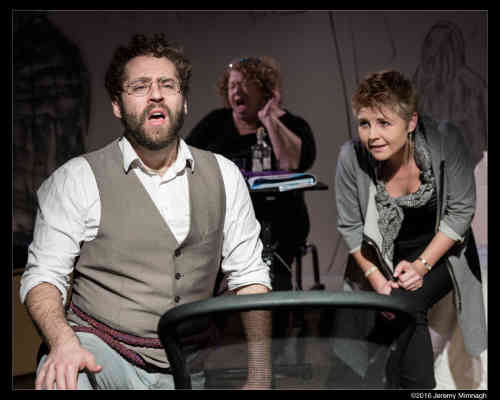 A multimedia theatre piece explores identity, loss, and family trauma at Toronto’s Ashkenaz Festival
A multimedia theatre piece explores identity, loss, and family trauma at Toronto’s Ashkenaz Festival
We Keep Coming Back, a multi-media theatre piece, had its Canadian premiere as part of Ashkenaz, the biennial festival of Jewish music and culture held at Harbourfront Centre. While the play depicts a very personal journey, it explores universal themes of identity, loss, and family trauma.
We Keep Coming Back tells the story of Michael and Mary, a mother and son who are the descendants of Polish Holocaust survivors. The two travel to Poland together to try to discover their family’s history, mend their difficult relationship, and reconnect with their past. The play is performed by real-life mother and son Mary Berchard and Michael Rubenfeld, who actually did make such a trip.
The play also features Katka Reszke, a Polish filmmaker whom Rubenfeld engaged to serve as a guide and translator and to document their journey. Reszke has her own story of lost identity. Although raised a Catholic, she feels a connection to Judaism and eventually converts and moves to Israel. Later she discovers that, in fact, her family is also Jewish, but has hidden their heritage for generations. Through Reszke, Rubenfeld discovers the contemporary world of Jewish life in Poland.
Berchard is charming on stage. Her relationship with Rubenfeld felt authentic, simultaneously loving and exasperating. She is not afraid to call him out when he is being childish or dishonest. The two can’t stand each other, but they can’t leave each other.
Rubenfeld comes off as neurotic and self-centered, hoping for an intense revelatory connection to the land of his ancestors while ignoring the daily reality of the Poles he meets along the way. But his love for his mother is real, though conflicted.
Reszke plays the role of objective narrator, often speaking in Polish, while an English translation is projected on the screen behind her. Her rational presence contrasts with Rubenfeld’s more emotional reactions to his experiences.
I particularly liked how the play used video footage and archival photographs to bring the journey to life. It felt like a being in a friend’s living room as he describes a trip. Rubenfeld frequently turns to the audience, asking their opinion of a situation, which adds to the feeling of intimacy.
Throughout the play, there are questions of what really happened. Is the town they visit really the town Mary’s father is from? Were Katka’s great grandparent’s really Jewish? Is what is shown on stage the real relationship between Michael and Mary? We Keep Coming Back makes the argument that maybe the exact truth isn’t important. What matters is asking the questions.
I find the stories of Holocaust survivors and the search for lost family history inherently moving and dramatic. However, there are fewer and fewer people left, both Jewish and not, who can bear witness to the atrocities and make sure the history is remembered. They have stories to tell if only they are asked. We Keep Coming Back plays an important part in creating that memory.
The question of whether trauma affects families across generations is not only relevant to the children of Holocaust survivors. The experiences of Canada’s First Nations and Vietnamese refugees are just two other examples of past violence having a long term impact on families. We Keep Coming Back highlights how asking questions and confronting those difficult pasts can be a step toward healing, even if what we discover is not exactly what we expected.
Details:
We Keep Coming Back played at the Studio Theatre at Harbourfront Centre on September 3, 2016.
Photo of Michael Rubenfeld, Mary Berchard, and Katka Reszke by Jeremy Mimnagh
